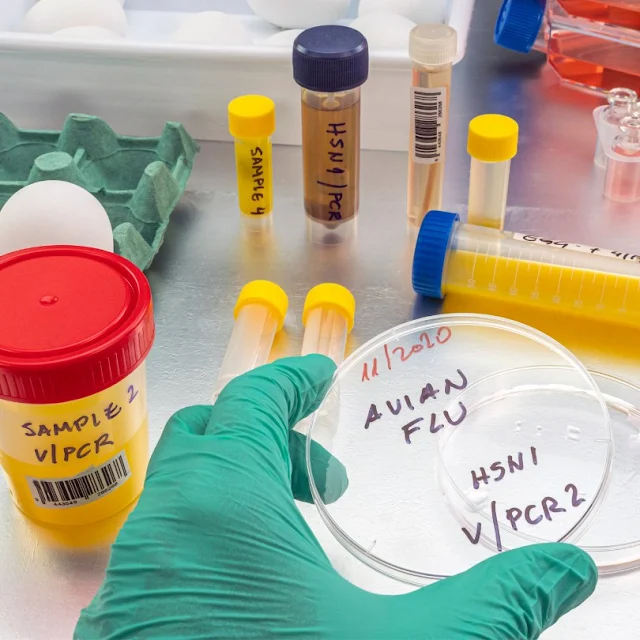This is a cross post because I think the subject is important. You will see many websites on the Internet recommending that cat caregivers provide their cat with raw chicken necks in order that they can chew on a raw product which is good for their gums and teeth and their health generally. It is believed that the risk of eating raw chicken necks and wings because of the cartilage and bone content is far outweighed by the benefits to their oral health.
 |
| Image: MikeB. Testing for bird flu. |
So, it is a balanced decision as to whether you feed your domestic cat companion raw chicken 'on the bone' so to speak. But that balance has been upset by the fact that bird flu is present in Europe. In Poland it appears to be at epidemic proportions and in that country around two dozen cats are believed to have died of bird flu, 13 of which were found to have been tested positive for H5N1 which has also proven, as I understand it, that they were fed raw chicken sometimes bought from local supermarkets.
I would advise, as I'm sure others would, that at this particular juncture, cat caregivers should not be feed their cat with raw chicken necks or wings unless they can be totally sure that the product is devoid of any contamination from bird flu. I don't know what checks are made. I suspect that in the UK and many other countries, all the poultry on supermarket shelves has been checked for diseases such as bird flu. But can we guarantee it? I think not.
But, as mentioned, in Poland, a European country and part of the European Union, 13 domestic cats contracted bird flu from raw poultry. This is just putting up a flag of caution in case people habitually feed their cat with raw chicken. It is not uncommon. And normally it is advisable. I don't do it but I think I might because reliable and respected experts on domestic cat caregiving such as Dr. Bruce Fogle DVM, recommend feeding bird wings to domestic cats to improve their gum health.
Poor oral health is very prevalent in domestic cats particularly elderly cats. It is almost impossible to clean their teeth unless they've been trained to accept it when kittens. The claims by dry food manufacturers that their pellets can help to clean teeth is dubious to say the least. They may help slightly.
However, I think that you will find that most veterinarians would agree that chewing on chicken necks or wings will improve teeth and gum health despite the risks of a shard of bone being broken off. Necks are probably better because they contain cartilage primarily and skin and muscle which makes them safer.
UK government notice 6th July 2023:
The Avian Influenza Prevention Zone (AIPZ) for poultry and captive birds, introduced to help stop the spread of avian influenza (‘bird flu’), has been lifted.The enhanced biosecurity measures were brought in across Great Britain in October when there was a medium risk for some poultry premises. The measures have been vital in protecting flocks across the country from the virus which is circulating in wild birds.




No comments:
Post a Comment